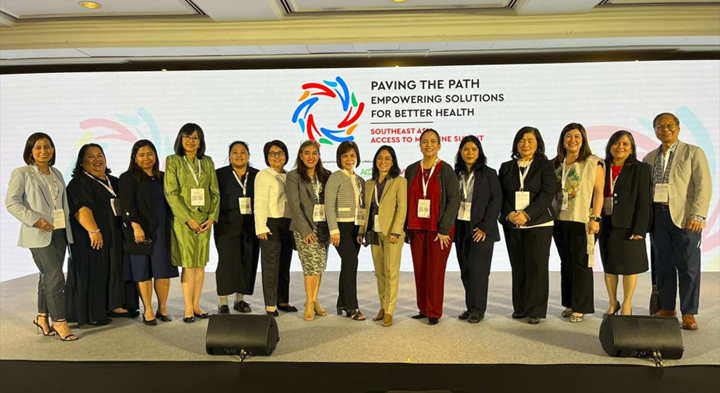
Advocating for the interests of patients should be part of a multi-sectoral approach to improving access to medicines, according to Filipino delegates from Takeda Healthcare Philippines who attended the inaugural Southeast Asia Access to Medicine (AtM) Summit, held recently in Bangkok, Thailand.
This regional summit gathered over 100 regional leaders, policymakers, academic institutions, healthcare professionals, industry players, and patient advocates committed to helping ensure sustainable and equitable access to innovative medicines for underserved communities all over Southeast Asia (SEA).
Based on World Health Organization (WHO) reports, progress toward universal health coverage (UHC) has stalled since 2019, leaving millions without adequate medical support. Many continue to grapple with fragile healthcare infrastructure, facing significant gaps in screening, diagnostics, and treatment availability. In the Philippines, 2023 data from the Philippine Statistics Authority show that only 22 percent of provinces had adequate primary care facilities, far behind the goal of reaching 50 percent. Critical to addressing these challenges in the Philippines as well as all over the region is the collaboration of all stakeholders from across the healthcare ecosystem. Governments, health organizations, and industry leaders need to drive sustainable solutions and equitable access to health care for all.
Highlighting the importance of magnifying patient voices, Prof. Guido David, director of the Diliman Artificial Intelligence Program at the University of the Philippines (UP) and OCTA Research Fellow, said: “From high treatment costs to limited access to medicines, and inadequate access to healthcare services, patients face challenges beyond their physical illness every day. These challenges often disproportionately impact those living with serious illnesses who require more tailored support and diagnosis by specialists. Patients in the Philippines, regardless of their socioeconomic status, should be offered timely and equitable medical treatment. If we can adequately leverage innovative digital solutions that enhance medicine distribution, patient engagement and treatment monitoring to expand access channels, we can make significant progress and ultimately contribute to the improvement of the Philippine healthcare system as a whole.”
Representing the Philippine Alliance of Patient Organizations (PAPO) Philippines, President Karen Villanueva, emphasized the critical role of collective efforts. She said: “To make a real difference to the patient experience and patient outcome, as endorsed by the World Health Assembly, we need to ensure regular, meaningful social participation in healthcare-related discussions. We have started to witness more proactive interactions across patient advocacy groups and other healthcare ecosystem stakeholders. We believe that, with long-term multi-stakeholder collaboration, we can bring about real changes to the healthcare ecosystem that tangibly improves patients’ lives.”
All throughout the summit, delegates participated in lively discussions centering on actionable strategies to tackle barriers to medicine access, including affordability, infrastructure limitations, and regulatory complexities. Participants also explored how public-private partnerships, health technology assessment schemes, and digital health tools could play a role in overcoming these challenges and improving accessibility for underserved populations.
A highlight of the summit was the Southeast Asia Access to Medicines Pledge, a commitment by all partners to drive long-term, sustainable change in the region with an opportunity for more stakeholders across the industry to join in. This pledge establishes a shared vision and collective responsibility to:
- Champion inclusive healthcare systems – Engage and mobilize stakeholders across the healthcare ecosystem, including governments, industry, civil society, and communities, to prioritize equitable access to medicines.
- Collaborate for innovation – Forge and strengthen partnerships that enable scalable solutions addressing diseases and conditions disproportionately affecting populations in SEA.
- Enable policy transformation – Advocate for evidence-based policies that remove systemic barriers to medicine access and strengthen healthcare systems in the region.
- Elevate community voices – Ensure that the perspectives of the most affected communities are integrated into decision-making processes, working in collaboration with key partners.
- Demonstrate progress – Support the creation of a concrete, measurable roadmap with achievable milestones that will track and assess improvements in access to medicines across SEA.
Looking ahead, the Southeast Asia Access to Medicines Pledge will serve as a catalyst for action, driving a shared roadmap to address critical healthcare challenges in the region. The commitments made at this Summit will mark the beginning of a sustained, multi-stakeholder effort to break down barriers to medicine access through innovation, collaboration, and systemic change.
The first SEA AtM Summit was organized by Access Health International, Asian Venture Philanthropy Network (AVPN), and SingHealth Duke–NUS Global Health Institute in collaboration with Takeda.


7 Comments
bienesonline.mx
bienesonline
this soo amazing article I like it very much.بازی mines
jkksdfjsdfasdfkjdsfbsdfbsdjfbkjsdbfbsdfbdfkjbdkjfbkdfsfbsdfjksdbfjkbdj
this soo amazing article I like it very much.بازی mines
this soo amazing article I like it very much.بازی mines
fcftcffcffcff
I think that thanks for the valuabe information and insights you have so provided here.۱x
cfcfgcchhvg
I think that thanks for the valuabe information and insights you have so provided here.۱x
njnkklkk